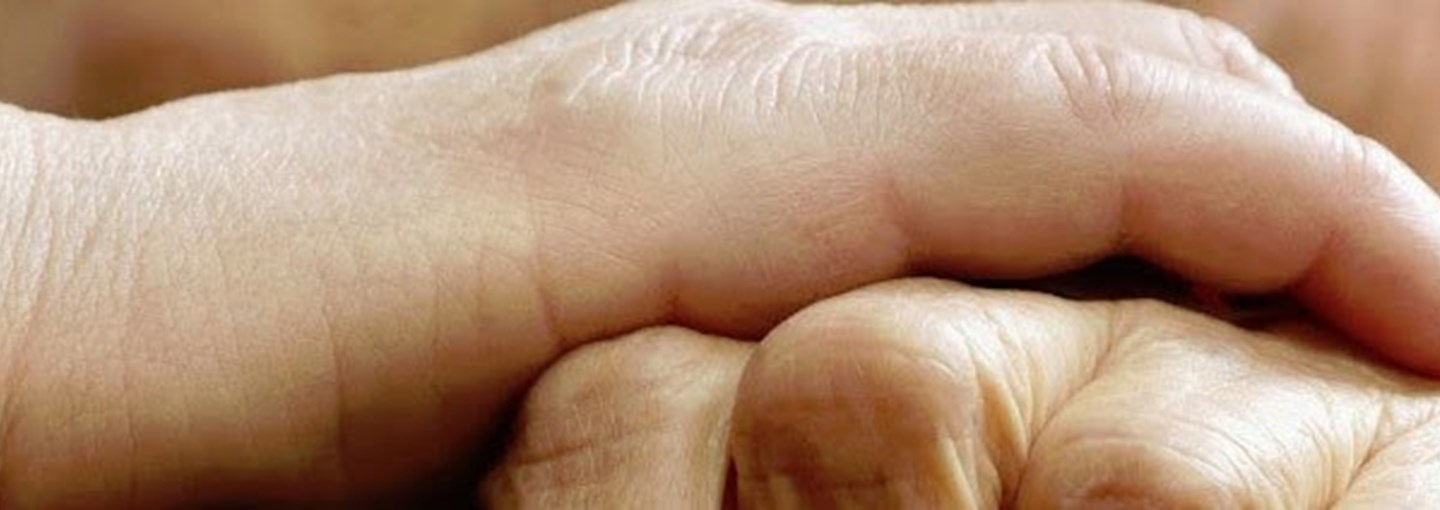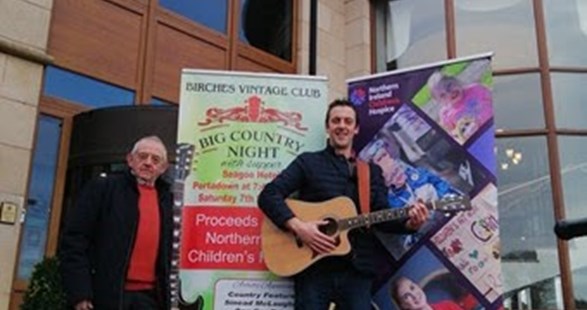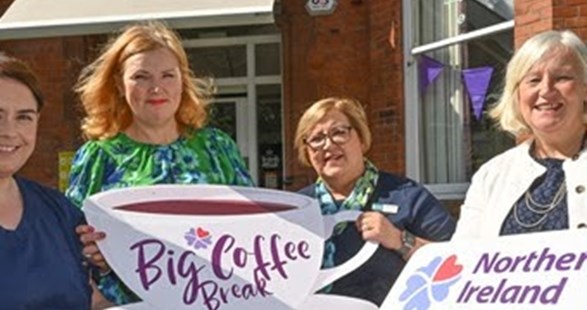

Hospice Nurse Rachel highlights the need to normalise conversations about death and dying

As part of Dying Matters Awareness Week, Rachel Kynes, Nursing Team Leader in our Adult Hospice, highlights the need to normalise conversation about death and dying in this thought-provoking blog piece.
As part of Dying Matters Awareness Week, Rachel Kynes, Nursing Team Leader in our Adult Hospice, highlights the need to normalise conversation about death and dying in this thought-provoking blog piece.
My name is Rachel Kynes and I have been a Nursing Team Leader in Northern Ireland Hospice Adult In-Patient Unit [IPU] for the past 6 years. I am part of a team who provide Specialist Palliative Care to any adult with a palliative diagnosis, whether it is cancer or another life-limiting illness.
I wanted to contribute to ‘Dying Matters Awareness Week’ because I know how important it is to raise awareness of starting a conversation with people across the country around death, dying and bereavement.
I know from my own experience that often these conversations have not taken place for a variety of reasons and as a result, individual wishes and preferences may not be known until the last hours or days of a patient’s life.
In Northern Ireland a range of organisations including hospitals, hospices, NHS Community Services, and other palliative care services work together 365 days a year to support people spend their final days in the environment or home setting of their choice.
Northern Ireland Hospice provides a range of care and support, including access to an inpatient unit (IPU). I am one of many skilled staff who are committed to provide patients and their loved ones with choices that best meet their needs and fulfil their wishes towards end of life.
For example, our Hospice Community Nurses provide an advisory and support role for patients being cared for at home alongside District Nurses and GP support.
A key role for Hospice is to ensure every patient under our care has high quality symptom control, including pain management so they can spend quality time with their loved ones. Last year 314 patients were admitted to our Inpatient Unit (IPU), some for symptom management with an aim to be discharged home and some to spend their final and weeks with us.
Our IPU is an 18-bed unit, all single rooms with ensuite bathrooms, and outside garden space. This arrangement provides individuals with the privacy and dignity required, so they can focus on what is important to them. This may be enjoying making memories for their families or following a particular hobby, such as listening to music.
We have a knowledgeable, skilled multi-disciplinary team working in the IPU Services, including approximately 30 Nurses and 20 Healthcare Assistants.
This means that patients can receive timely, high quality care given through the continuity of the nursing team. As a team, we each have our roles and each role is vital to provide holistic care.
Our medical and nursing team members are expert at symptom management using a full range of medications, our Physiotherapy and Occupational Therapy team work on improving mobility, reducing the risk of falls, getting people ready to go home, and giving advice on fatigue management.
The Social Work Team provide emotional support, arrange care for home, provide memory work for patients with young families and provide financial advice signposting and bereavement support. We have Chaplains and Complementary Therapists that help support patient’s spiritual needs and provide support and relaxation therapies for both patients and their families.
Our patients and their families may require a huge amount of holistic support in their final weeks and days and as a multi-disciplinary team we collaborate and work hard to ensure all their needs are met and wishes fulfilled. Working together gives the individual and loved ones the confidence that the care and support is there 24 hours a day, seven days a week. This allows them to focus on what is important to them.
On admission there are always discussions with patients and their families about what their preferred place of care and their preferred place of death is, so that we can work towards achieving these wishes.
As a nurse team leader, I meet patients at different stages of their journey and help treat their symptoms throughout their final months or weeks. Many of our patients have multiple admissions with us before their final admission.
As an experienced nurse I know that some patients initially have a preference to die at home, but when the final days move closer, they may change their mind and decide to spend their final days at Hospice. The most important thing in my view is to be flexible and meet their requirements. This is why a conversation about their choices and preferences early on, then ongoing throughout their care is so important, so that their wishes are documented and made clear especially where their preferences have changed.
I particularly recall one patient who came to Hospice from hospital and their wish was to spend their final days at home; this patient was admitted for symptom management of pain. The patient was bedbound, unable to move their legs or arms. The discussions of preferred place were started at admission and it was very clear this patient wanted to die at home, surrounded by close friends. We were very aware that this discharge would be complex specifically regarding the amount of care this patient would require at home and we were concerned that community care may not be best suited to his individual needs.
Our Social Work Team asked that we complete a 24-hour care chart so that we were aware of exactly all that the patient would require, and so that the community team could let us know if they would be able to meet this patient’s needs. This was an unusual situation, as typically a patient with such complex care needs requiring round the clock support may choose to avail of nursing home support. Working together with colleagues we managed to secure a 24-hour home care package for this patient and successfully discharged them home for their final days. It took a lot of coordination and organisation to achieve this; it felt so brilliant the day the patient was taken home by the ambulance.
The Covid-19 pandemic has completely changed how we do things in Hospice. The obvious one being the Personal Protective Equipment (PPE), creating a barrier between us and our patients and their relatives. This made communication much more difficult, especially through difficult and emotional conversations. In line with the government recommendations our visiting arrangements changed, and this has also been very challenging, as we are so used to having lots of people in and out in an extremely flexible way.
Families and patients have often required more reassurance due to the anxiety caused by Covid-19 as well as their life limiting condition. This has been particularly challenging for the whole team to keep families together yet keep them safe from the virus.
Personally, this year has been very tough! My husband is also a health care worker and we have a young daughter, so most of 2020/21 was spent working opposite shifts to my husband. This, along with a house move, was hard and truly exhausting, but I have developed personal resilience.
This was something that I learned about as a participant on the Nightingale Challenge Northern Ireland Global Leadership Development Programme as the programme included key aspects of learning around leadership and resilience and how to build self-care in ourselves and in our colleagues.
It is definitely something I am becoming better at doing and will continue to use moving forward. The programme also gave me new knowledge and a wider network, including meeting nursing and midwifery leaders from all around the world. Immediately before lockdown I was privileged to host a visit to the Northern Ireland Hospice by a Palliative Care Advanced Nurse Practitioner from the USA, Dr Billy Rosa as part of this programme.
I keep reminding myself on the tired and worn-down days when it felt like Covid-19 is never ending, that each patient is different, each family is different, and each person's final days are different. People thinking about their final days and how they want it to look is really important.
It may not always be possible to achieve all their wishes but involving them in the decisions gives them the control back that they inevitably lost when they received their palliative diagnosis.
As a nursing student I felt that palliative care was the speciality that I would most likely move towards and I did my elective placement in a local hospice. I remember studying a textbook and there was a phrase written on the inside of the cover that has never left me and spurs me on during the hard days:
“From the nurse, patience and understanding.
From the doctor, skill and compassion.
From the patient, courage and endurance.
Palliative Care can be a challenging but hugely rewarding speciality. I do this role because I love admitting a patient who has been having a really difficult time at home and seeing them settle with us. Seeing loved ones relax and the weight lift off their shoulders as they come through the doors.
I love sitting chatting through the memories with a daughter in the middle of the night, keeping her company in her mum's last hours. I love making tea and toast for a mother who doesn't know she needs it until I come through the door with it. I love using the evidence-based professional advanced clinical skills and knowledge that I now have in order to give patients the very best care that I can.
I love seeing a patient walk out to their car to go home because we've managed their complex pain so well that they can sit in a car again. This is why I wanted to contribute to ‘Dying Matters Awareness Week’, to share my experience and my story, because every person deserves to make their own informed choices and receive the support and care they need when their final days come.
Related News
Sign up for our CONNECT newsletter











